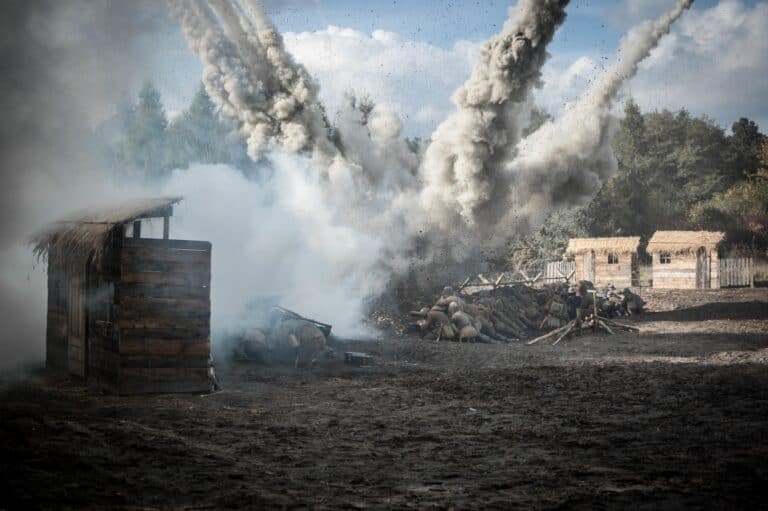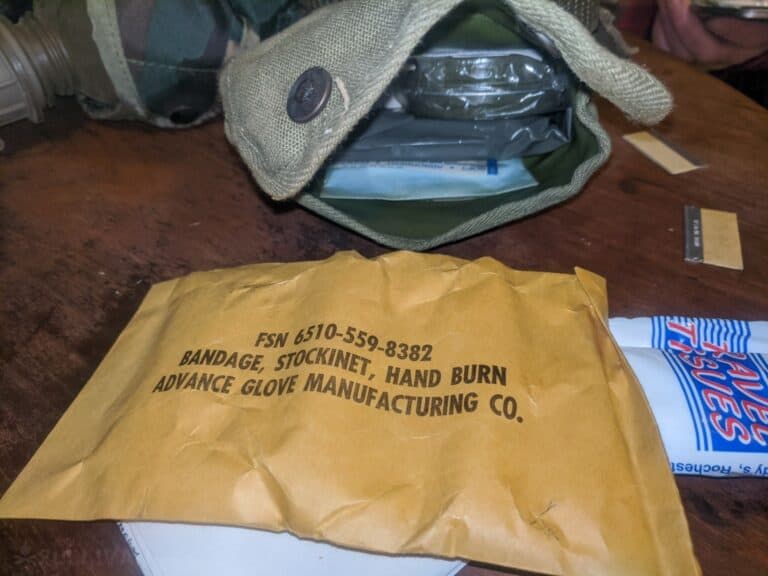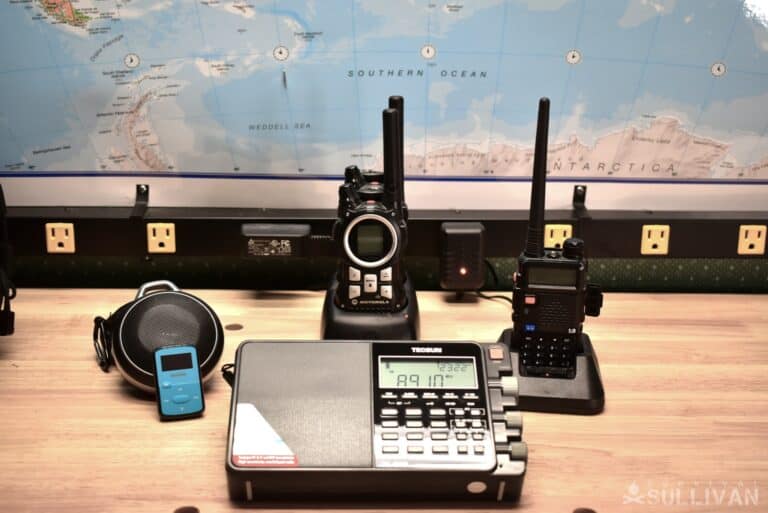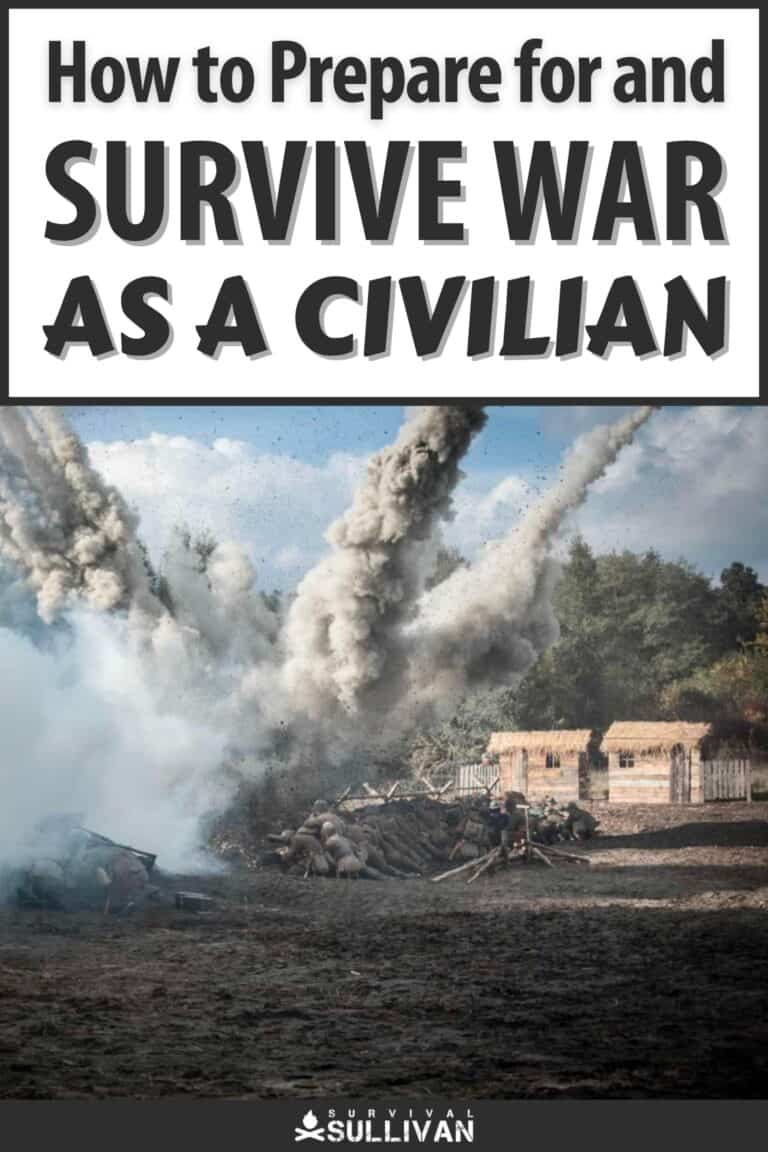Among all the many disasters that everyday citizens might try to prepare for, one that increasingly looms large in the minds of many is the prospect of total and open warfare.

Since pretty much forever, it has been civilians, not armed soldiers, which have suffered the most during major conflicts.
With cities targeted for destruction due to strategic necessity or entire population groups being singled out for extermination, war zones and conflict zones are not good places to be if you are just an average person trying to survive. That’s a scary thought.
It is easy to find information that will supposedly inform you concerning what to do and what actions to take if you want to participate as an unofficial participant in a war.
There are precious few that tell you what to do if you just want to get you and your loved ones out of harm’s way.
If you fall into the latter category, this guide can show you what to do when war threatens your part of the world. Keep reading to learn more.

Should You Bug In or Bug Out?
One of the most common questions that I get asked on the topic we are discussing today is whether or not someone should plan to bug in or bug out when war comes knocking. The only reasonable answer is, of course, “it depends.”
Depending on your specific context, depending on where you live, depending on the depth and breadth of the conflict zone, depending on the direction hostilities are moving- you get the idea.
You might be facing a frantic evacuation for your very lives if the shooting is close or you might just be hearing about the war as some faraway event happening across the country.
Accordingly, you should not plan on doing one or the other for any arbitrary reason.
Instead, be prepared to do both. Sheltering in place might be the very best thing you could do even if the fighting is nearby.
Conversely, evacuating from an area that is calm and safe could be prudent if it looks like the fighting will move your way; you always want to get out while the getting is good!
If You Want to Survive, You Must Be Ready
It never fails that there is a certain sector of the population that believes, at the site of their heart, that an outbreak of war or other sustained conflict is somehow going to be cool, fun, daring, or adventurous.
Or, dulled by too many years of domestic peace, that at least they will not be bored for the duration.
Nothing could be further from the truth. Especially if you are a civilian caught in the gnashing teeth of armed conflict, war will be nothing but lack, depravity, bloodshed, and mayhem.
However, just because it is a total nightmare does not mean that you cannot meaningfully prepare for it or that you can’t do anything about your fate when war is at your doorstep.
The following action items will help you and your loved ones get prepared to face the unthinkable.
Start With These 10 War Survival Action Items
- Prepare Your Family – Your loved ones must be willing to contribute to the group efforts, or at the very least not sabotage yours. Proper previous planning and discussion can ease tensions when the unity of action matters.
- Stockpile Food, Water, and Other Goods – Wars drain resources like nothing else. Unless you want to go without you must have stocks of everything you need on hand.
- Have a Place to Go – Running away from danger in a random direction might cause more problems than it solves. You should have pre-selected evacuation or fallback locations in mind before things get bad.
- Stick Together – Forget the lone wolf survival mentality. Individuals and small groups are incredibly vulnerable in wartime. Find and stick with a larger group.
- Learn Basic Survival and Sustainment Skills – Societal services and utilities will be intermittent to non-existent during the war. So learn some military skills so you can live without them.
- Have a Means of Transport – Vehicles can give you the speed and range you want for movement, but beware- they have major limitations in war zones.
- Learn Basic Self-Defense – You must know how to defend yourself in areas of open conflict. Not necessarily from soldiers, but from the criminal and the desperate.
- Learn First-Aid – There are countless ways to get hurt and die in a warzone. Knowing how to treat basic injury and illness along with trauma is mandatory for survival.
- Radio Communications are Essential – Don’t count on cell phones. Use radios for keeping in touch with friends, family, and government broadcasts.
- Stay Away from Danger Areas – Straying into the wrong place will get you killed in a blink, even when bullets and bombs aren’t flying.
1. Prepare Your Family
One of the single most difficult challenges you might face when getting ready to deal with the threat of war is simply getting your loved ones, particularly your family, to take it seriously.
At the best of times, disaster preparations and contingency planning are usually met with exasperated gasps or eye-rolling.
People who want to be ready for entirely real emergencies are often treated as loons or doomsayers.
Despite this, and however likely or unlikely such events may be, those of us who want the best possible chance to survive to know that the time to get ready is well before the fateful day arrives.
Action Steps
1. The best thing you can do, is to get your family on board with common sense planning and preparation.
If you are faced with outright hostility, make your own plans and own material preparations that will benefit your loved ones when the time comes, and then have the strength of will and leadership skills that will ensure they follow your lead.
2. Cold reality will make believers out of the staunchest critics, but it is not enough to be materially prepared when that happens.
You must have a plan and know how to implement it if you want to calm what fears you can and get your family through the event safely. Follow the outline in this guide seriously!
3. If you can’t get your family to join in the preparations the next best thing you can do is to get yourself ready so you can be the leader that they will need then more than ever.
If you give up when faced with ridicule or indifference now you will not rise to the occasion when war breaks out.

DIY pantry shelves with various items stockpiled
2. Stockpile Food, Water, and Other Goods
One of the most important factors for wartime preparation is establishing a stockpile of food, water, medicine, and all the other things you need for daily life well ahead of time.
This is because wars, whether actually at your doorstep or not, have a way of draining vast oceans of resources from all sectors of life.
Food, water, medicine, manpower, and even knowledge will all be directed to the war effort where they are needed most.
Or, as is often the case, war will directly touch centers of production and methods of transportation for every sort of good or service.
- Expect to see strict rationing, empty shelves, a supply chain that is ground to a halt, and more economic depression than you can countenance. If you are not already well prepared by the time war breaks out in earnest, you and your family will have to put up with grumbling tummies and tightening belts.
- If you don’t prepare now you will go without.
- Consider a comprehensive 6 month supply of everything the bare minimum. Don’t forget about hygiene supplies, prescription and over-the-counter medicines, vitamins, cleaning supplies, and clothing to go along with your food and water!
- A comprehensive overview of your supply stockpile is an entire article, or series of articles, unto itself but we have you covered right here.
3. Have a Place to Go
You must know where and under what conditions a “safe” place really is safe. When fighting draws close it is not enough to just head away from it. You might be blundering into an even worse fight or one that is soon to be embroiled in fighting itself.
If you live in a city, heading to less populated areas away from major transit routes is smart. But if you live in the country you might be forced to flee to a city and support from others.
- Have at least 3 preselected places to retreat to when danger threatens.
- Consider what circumstances might make your fallback areas dangerous or compromised.
- Will you have any way to verify the conditions at your safe place before you get there?
- Are there any terrain or weather concerns that might block your access at certain times of the year?
4. Stick Together
One of the biggest mistakes a civilian can make when it comes to preparing to survive war is planning on heading to the hills and going it alone or in a very small group. I understand the sentiment, but this is the wrong play.
- War has a way of turning isolated people into mincemeat. Your only hope for survival, when embroiled in a legit war, is to band together in larger groups that have mutual trust and affinity for one another.
- You’ll need plenty of people to help out. That is the only way you can ensure you have enough people around you to take care of necessary work when someone is sick or injured, to keep watch during times of trouble, and generally provide enough redundancy in manpower when required.
- Do you know several tight-knit families that you can rely on for working and living together as a unit? Will you be forced to make an alliance of convenience made up of various survivors? The more “knowns” you have at the beginning the better off you will be.
- Consider that you will need more room to accommodate more people wherever you are, but expect to be crammed into very close quarters when the situation dictates.
- In war isolated people, even entire families, in out-of-the-way places are regularly preyed upon by combatants or criminal elements that invariably pop up in warzones. Don’t think you are better off alone (especially in a remote area) in a warzone.
5. Learn Basic Survival and Sustainment Skills
If you are totally dependent upon the basic institutions and systems of daily life in civilization for survival then you very well might not survive the coming of war!
What is needed is greater self-sufficiency, and this self-sufficiency will come in the form of traditional survival skills.
- Survival skills are those that ensure you continually have access to the survival necessities: warmth and shelter, water, food, security, and so forth.
- You should know how to improvise a shelter from found debris and other materials, and you should also know how to create a shelter from natural materials alone.
- Treating natural and scavenged water sources in order to make them safe to drink is critical.
- You should know how to find and prepare some kind of food no matter the environment you are in.
- Lacking any of these skills is a significant vulnerability during wartime.

6. Have a Means of Transport
It is entirely natural that most people would think of their personal vehicle as their primary means of escape during a war.
After all, what could be better than hopping in your car, turning the key, and quickly putting dozens to hundreds of miles between you and the fighting?
Honestly, not much and if you are able to do so then you definitely should and do it before things get too bad.
However, the chief oversight of people who place all of their hopes in this plan is that there will be hundreds of thousands, potentially millions of other people thinking the exact same thing.
Gridlock will be the rule on the highways and interstates whenever war draws near.
And, not for nothing, it is entirely possible that your vehicle could suffer a mechanical breakdown, flat tire, or some other mishap that renders it immobile. It might even be stolen by someone desperate or deranged enough to carjack you at the time!
- Keep your personal vehicle well-maintained and inspected.
- Maintain a balance between the cargo room and a low-profile. Big, off-road rigs will draw attention.
- You must have a backup plan for travel in case your vehicle is not an option, including walking out on foot if absolutely necessary and viable under the circumstances.
- Don’t rule out alternate modes of transit by motorcycle, boat, or rail, if your situation permits.

7. Learn Basic Self-Defense
When hostilities have reached the boiling point and bullets and bombs start flying, it makes perfect sense that most sane people will start thinking of self-defense themselves.
Of course, we want to protect ourselves and our loved ones from anyone that would hurt them, but you must think this through carefully if you are actually in a conflict zone. The notion is something of a catch-22.
Generally speaking, people that are in or near an active war that happen to be armed are usually participants and will be viewed accordingly by either side.
Now, this does not mean you will necessarily be wearing a uniform, but that doesn’t matter to the people that might shoot you on-site and ask questions later.
Any conflict zone is always going to be infested with partisans, guerillas, freedom fighters, criminals, and other so-called independents or opportunists, and professional soldiers and mercenaries alike know that.
Sure, you might just be standing on watch with your rifle to keep your bug-out location or home safe, but they won’t know that.
- Being caught anywhere with an obvious firearm is going to attract the wrong kind of attention and then bullets in short order.
- Guns must be kept out of sight until utterly needed. Any defensive weapon that is kept on your person must be effectively concealed to avoid drawing fire out of hand, and that means a handgun is the order of the day.
- Keep in mind that being caught with a gun at a checkpoint might see you detained or killed outright.
- Basic hand-to-hand and grappling skills will help you deal with pushy or desperate people without resorting to lethal force.

military surplus first aid pouch open
8. Learn First Aid
There are countless ways to get hurt or killed in a warzone. Learning how to treat injuries and illnesses when doctors and other professional medical care will be in short supply (or non-existent) is essential.
- Get training in basic first-aid and CPR now, while you can. Practice!
- Also learn basic trauma care for penetrating injuries, lacerations, burns, fractures, etc.
- Keep plenty of medical supplies on hand before you need them!

emergency radios: UV5R, Motorolas, ClipJam, and Tecsun
9. Radio Communications are Essential
One of the single most important considerations when it comes to getting prepared to survive the war as a civilian is the necessity of reliable and redundant communications.
Staying in touch and coordinating with friends, family members, government agencies and non-governmental relief organizations is absolutely imperative. However, it might be easier said than done.
Though we are all more or less completely dependent upon our cell phones these days, you should not count on them working in or near a conflict zone.
Either due to towers being shut down, damaged, co-opted, or destroyed in the fighting, your cell phone is probably going to be belly up.
- Your single best, most reliable, and most versatile form of communication is going to be radio and shortwave radio in particular.
- For coordinating with other members of your group or family in a local area or reaching out to people who might be across the state or across the country, radio can make it possible.
- A radio set will allow you to send and receive, and with the appropriate skills potentially do so over vast distances, not reliant on any high-tech infrastructure.
- Every government agency worth mentioning has contingency plans in place to communicate with citizens during a crisis through the use of government and civilian radio relay systems.
- Radio operation is a nuanced skill: start learning now!
10. Stay Away from Danger Areas
The best thing you can do to improve your chances of surviving open war is to stay away from dangerous places. Your chances of death go up exponentially in any of the following areas:
- Areas of active fighting.
- Strategic or tactically important places or installations.
- Known areas where violence or punitive action is committed against civilians.
- Major thoroughfares near or through frontlines.
- Any place subjected to lots of explosive ordnance: unexploded ordnance in the form of shells, bombs, and rockets (UXO) can easily kill or maim you long after the fighting has ceased.
- Any known or suspected minefield.
Prepare for War While You Can
For some people, the notion of trying to survive through actual war is too terrible to think about.
But sticking your head in the sand is not a viable tactic, and wishing that it won’t happen here is not a strategy.
War has been with humanity forever, and with the right plans and preparations, it is possible that you and your family could survive an outbreak of war as civilians. Implement the procedures and advice on this list and you will have a better chance than most.

The post How to Prepare for and Survive War as a Civilian appeared first on Survival Sullivan.
By: Charles Yor
Title: How to Prepare for and Survive War as a Civilian
Sourced From: www.survivalsullivan.com/how-to-prepare-for-war/
Published Date: Sun, 27 Nov 2022 16:00:00 +0000
------------------------
Did you miss our previous article...
https://bushcrafttips.com/bushcraft-news/do-emps-affect-batteries
 What is BushcraftSurvival SkillsToolsVideosBushcraft CampsBushcraft KitsBushcraft ProjectsPrivacy PolicyTerms And Conditions
What is BushcraftSurvival SkillsToolsVideosBushcraft CampsBushcraft KitsBushcraft ProjectsPrivacy PolicyTerms And Conditions
